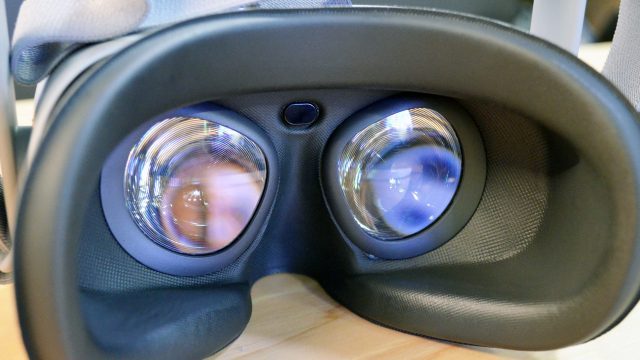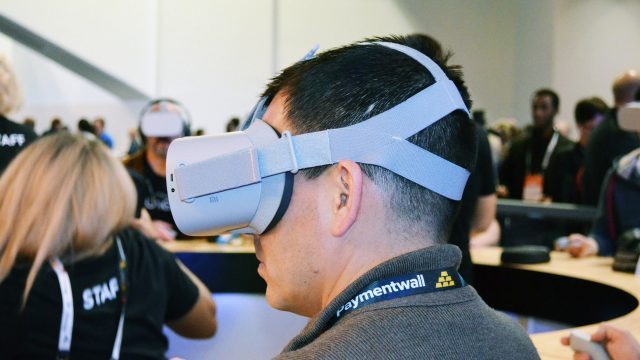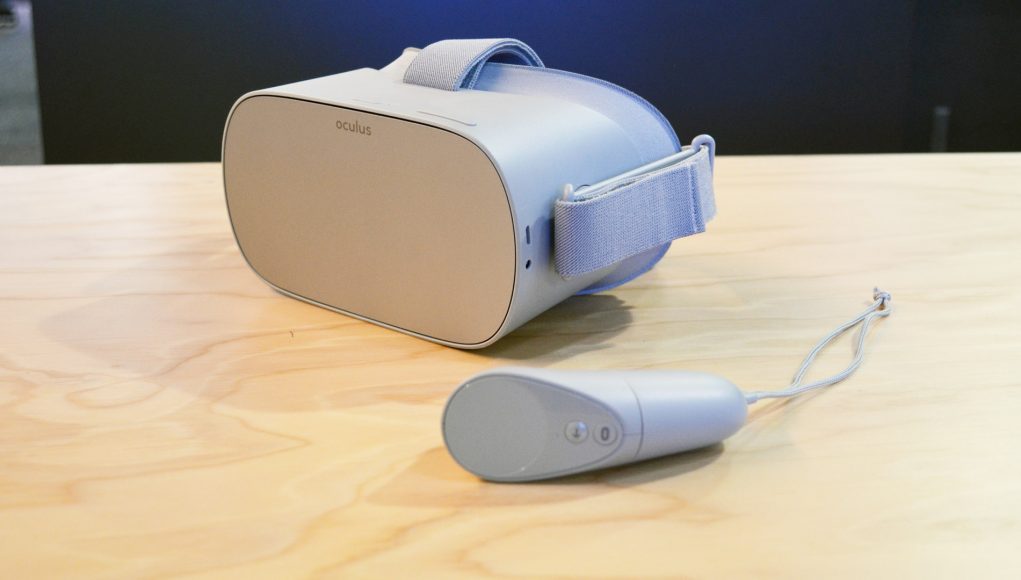Oculus Go was announced months ago, but it wasn’t until this week at GDC 2018 that the company actually made the headset available to try.
At the Oculus booth today we got our first good look at Oculus Go, the $200 standalone VR headset that the company hopes will hit a sweet spot of price and accessibility. The Go is a lot like Gear VR, but instead of snapping your phone into the headset, everything is built inside. That spares you from needing to drain your phone’s battery as you play, and unlocks the power of the hardware inside by offering improved thermals and removing unnecessary components.
Visuals

Putting on the headset, the new lenses (now Fresnel) offer what appears to be a larger field of view than the latest Gear VR, achieving a view close to that of the Rift. In terms of resolution, the Go (like Gear VR) actually packs quite a few more pixels than the Rift: 1,280 × 1,440 vs. 1,080 × 1,200.
Of course, resolution is only one part of what determines the overall visual fidelity, and while the view inside is noticeably more sharp than in the Rift, with much less screen door effect, the more limited horsepower means that the graphics of the games inside the headset still fall easily into the “mobile” class. Granted, Go’s sharp display would probably be preferable if photo or video viewing is your primary use-case. We’ll need more hands-on time with the headset to really get a good feel for the finer details of the display, but if ‘Gear VR graphics with an Oculus Rift field of view’ means anything to you, then you’ve already got a good sense for Go’s visual performance.
Controller

The Go controller, which seems to borrow its core shape from Touch, feels more comfortable than the Gear VR controllers that launched last year. Its rounded design just seems to fit so nicely in your hand, and the bend at the top makes reaching the trackpad and buttons easy, while the trigger is in a great spot and depresses along a hinge (which feels more natural), rather than being a glorified button.
Like the headset itself, the Go controller only supports rotational (3DOF) tracking. Games use the rotational movement to roughly infer the movement of your arm, but ultimately the experience is like playing a game where your arm is attached to your torso by your elbow—meaning your can swing it around, but only from a singular point. It’s better than having no controller, but not nearly as good as having a fully tracked controller (6DOF), like we see with more advanced headsets like the Rift and Vive. For more on how the controller is used with the headset and as input for VR games, much of our Gear VR Controller Review applies (as both controllers have feature-parity and are cross-compatible as far as apps are concerned).
Convenience Over New Features
Given that Go supports all Gear VR apps, you won’t be surprised to find that the in-headset experience is very similar to Gear VR, which means it’s decidedly ‘mobile class’ in terms of interactions and graphics. However, many of Go’s biggest benefits are about convenience and ease of use rather than differences in features and functions.
For instance, the audio from Go’s built-in speakers is smartly routed through the stiff struts of the headstrap; a small slit lets the sound out right near your ears. That means you can get decent audio without needing to fiddle with headphones after you’ve put on the headset (a surprisingly grating annoyance). And while you could always do the same with Gear VR, in that case it would just use the phone’s speakers, which aren’t very high quality, are muffled by the headset, and can’t offer proper stereo. With Go, you get better headphone-free audio, and it’s stereo too.

It was unfortunately too loud where we were testing Go to get a good feel for the audio quality, so we’ll have to revisit that aspect. At very least, it can get quite loud, easily loud enough for me to hear the game I was playing against the background of thousands of conference goers on an expo floor. Luckily, there’s also a 3.5mm audio jack on the headset in case you do want enhanced quality or a little more audio privacy.
Another convenience is simply not needing to A) own one particular type of phone in order to use a Gear VR, and B) not needing to sacrifice the use of your phone to your VR session. With Gear VR, you have to slap your phone into the headset which means draining its battery, making you unavailable calls, texts photos, etc, and dealing with fingerprints, dirt, and dust on your phone’s screen. With Go, all the hardware is built in so you can just pick it up, put it on, and …Go (I see what they did there).
What’s more, building the hardware into the headset to be optimized for VR has huge advantages over trying to use phone-optimized hardware. The key is that, because Go doesn’t have to be a phone, Oculus can eliminate unnecessary components, spread things out, optimize components (like putting in a bigger battery that couldn’t fit in a phone), and overall create much more efficient thermal dissipation from the same kind of hardware which is otherwise crammed into your phone and tuned for very different types of usage. Better thermal dissipation means the hardware inside can run faster with less risk of overheating, which Gear VR is often prone to do.
So even though Oculus Go is powered by phone hardware that’s several years old, Oculus says it can perform better than Gear VR, because the extra efficiency allows it to run at higher performance, which means cranking up the rendering resolution and even the framerate.
Aesthetics

Like the Rift, it’s clear that a lot of thought has been put into the Go’s aesthetics. The headset feels very solidly put together, and made with materials that feel more like a ‘device’ than a mere accessory. And while the headset feels a bit front-heavy, the strap design helps offset that with a few smart additions, like the rigid struts around which the headset can pivot against the user’s face, and the double-strap in the back that finds a nice place to hug your head. Short term comfort seems promising, but until we have a good hour or so to wear the headset, it’ll be tough to judge long term comfort.
– – — – –
While the Oculus Go lacks some features (like 6DOF headtracking) offered by other forthcoming standalone headsets like the Lenovo Mirage Solo ($400), it’s also going to be priced at half the cost ($200), despite a very similar visual experience. In the end, Oculus’ focus on accessibility (both by hardware design and by price) seems like it could more readily appeal to the kind of casual VR user that the Go and many other standalones are targeting.







